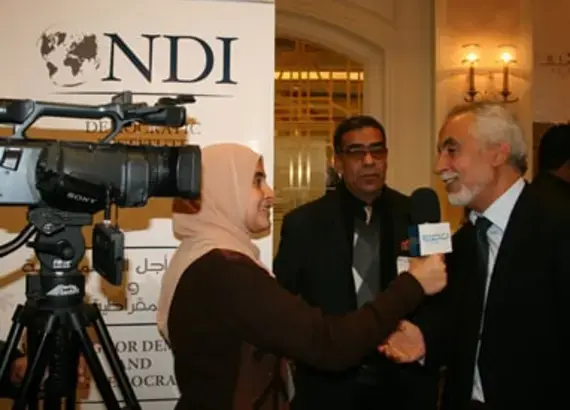
Success Story
For the First Time, Libyan Parties Meet to Discuss Elections
Representatives from 33 of Libya’s new political parties gathered in Tripoli March 1 to learn about the new law that will govern Libya’s first election in nearly 50 years. The late June vote for a constituent assembly will be the first time any of these parties will wage competitive campaigns, and how well they learn the rules of the game will help determine their success as they vie to shape the future of the country.
The emergence of political parties is a new phenomenon in Libya. They were outlawed during Muammar Gaddafi’s 42-year rule and anyone who participated in a party was declared a traitor. Since Gaddafi’s ouster last October, dozens of parties have formed and will compete in elections.
Meeting in the hotel that once served as the center of Gaddafi’s propaganda machine, the NDI-organized event was the first opportunity for parties to interact with transition officials responsible for managing upcoming elections. The outcome of the voting will determine the membership of the 200-person National Public Conference (NPC), the body that will be charged with drafting a constitution and designing the institutions of Libya’s new democracy.
Lamin Belhadj, a member of the National Transitional Council Election Committee, discussed how the election law was drafted, its provisions and how they affect political parties. Three members of the High National Election Commission spoke about the body’s role and the need to begin a dialogue with political organizations. Members of both institutions took questions and comments from the audience.
The ensuing discussion addressed a number of issues including:
- The need for transparency in the development of the election process;
- The timeline for elections, including when parties and candidates will need to register;
- The challenges of voter registration with no recent census or national identification system;
- Special measures to ensure the participation of women;
- Security considerations for candidates, party officials and voters;
- Accreditation for domestic and international observers; and
- Campaign regulations involving media access and finance.
Many agreed that the most important challenge will be raising awareness among average citizens about the election and the role of the NPC, which is unprecedented in the country’s history.
The event was also the first time so many parties were able to come together. “We had the opportunity to interact with a party we had not known before and found that we have a lot in common,” said the campaign manager for one party. “We’re now discussing ways that we may be able to work together.”
Related:
Published March 19, 2012



